This is Part I of a three-part series on the interfaith dialogue.
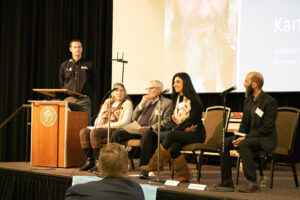 What do diverse faith traditions say about neighborliness? That was the question at the forefront of Pikes Peak Habitat for Humanity’s 3rd Interfaith Dialogue, “Who Is Your Neighbor?,” held on the UCCS campus on Sunday, Feb. 4, as part of our observance of the United Nations World Interfaith Harmony Week Feb. 1-7.
What do diverse faith traditions say about neighborliness? That was the question at the forefront of Pikes Peak Habitat for Humanity’s 3rd Interfaith Dialogue, “Who Is Your Neighbor?,” held on the UCCS campus on Sunday, Feb. 4, as part of our observance of the United Nations World Interfaith Harmony Week Feb. 1-7.
Despite the previous day’s heavy snowfall, more than 90 participants joined us for the event, which featured a panel discussion, a speaker from the Colorado Springs Mayor’s Office, and facilitated, small-group interfaith conversations.
Panel Discussion
The event began with a discussion featuring four panelists:
- Dick Conn, founding president of Temple Beit Torah
- Gilas, a future Pikes Peak Habitat homeowner who practices the Yarsani faith
- Janice, a future Pikes Peak Habitat homeowner and member of the Springs Reformed Church
- Kamel Elwazeir, former president of the Islamic Society of Colorado Springs.
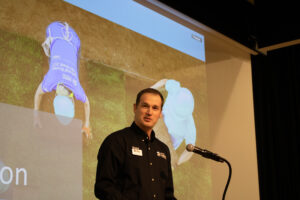
Pikes Peak Habitat board president Eric Stolp moderated the discussion. Panelists answered questions about their own experiences with housing and homeownership in El Paso County, their faith traditions’ teachings on neighborliness, and their suggestions for how participants can help address the affordable homeownership crisis in our area.
“This is our chance to tell the whole world that we live in a blessed country,” said Elwazeir. “People come from all over the world, are able to sit on a panel and talk about our differences and talk about faith freely, without having to fear for your life. Praise the Lord for this blessing that we have.”
Neighborliness in Diverse Faith Traditions
“So this is where the pressure really comes in, because my rabbi is sitting right in the back!” joked Conn.
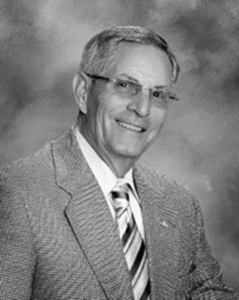
He continued, “Throughout the Hebrew Bible, the Torah, prophets, and writings, are references to the importance of neighborliness and helping those less fortunate.” He cited passages from Isaiah, Proverbs, and Psalms that reference tzedakah, which “in Hebrew means charity, charitable giving, so that’s one principle we must adhere to, which is helping our neighbors,” he explained. “At Temple Beit Torah, an important part of our mission is outreach. In fact, outreach is stated in our mission, and tzedakah, helping those less fortunate.”
“There is a phrase in Arabic,” said Gilas. “Maybe when I translate, it doesn’t mean anything, but it means a lot to us. So it says like…it means you have to buy the neighbor and then jump on to buy your house, so the neighbor is that important in our belief! I have a Kurdish religion; it’s called Yarsani. But I grew up in the place that the majority, they’re Muslim, and we learn a lot from each other. To me, having a good neighbor and being a good neighbor, it’s a vice versa.”

“The religion of Islam in Arabic means submission, so to be a Muslim, or a true Muslim, I submit to the will of God,” Elwazeir explained. “Regardless of what your religion is, if you’re a Jew or a Christian or a Muslim, it is doing the right thing.”
He asked, “What does God want you to do when you have neighbors?”
In his faith tradition, he said, “we take the teachings from the Koran, which is the book of the Muslims, and the sunnah, which is the tradition of the prophet Mohammed, peace be upon him. And one of the sayings that Prophet Mohammed used to say is that the angel Gabriel would command me of my neighbor constantly, to the degree that I thought that the neighbor will be included in the inheritance. And that that time, the neighbor of the prophet Mohammed was a Jewish neighbor.”
Elwazeir explained, “Many stories in my faith teach me that you’re not considered a true believer if you don’t hold the evil back from your neighbor. And it didn’t specify if you have a Muslim neighbor or an atheist or a Jewish or a Christian neighbor. The prophet constantly said he is not a believer, he is not a believer, he is not a believer, who does not stop the evil from extending to his neighbor.”
He drew chuckles and murmurs of agreement from the audience when he said, “God forbid, if I see a fire across the street, I’m not going to say, ‘Well, he’s a Jewish neighbor, let him burn,’ or ‘He’s a Muslim neighbor from a different sect, so let him burn.’ No! I would immediately do the right thing. I will jump out of my house and go knock on their door. If I have to jump over the fence to save the family, I will do it because that is the right thing to do. And that’s across the board, whether we like it or not.”
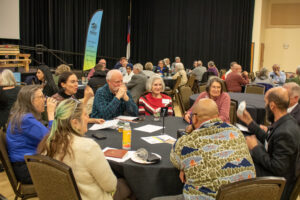 “God teaches you to be a good man, a good woman, a good whoever you are–a good human being,” said Elwazeir. “If you see someone on the highway with a flat tire and you can help, or stranded like the snowstorm that we had yesterday, and we have the capability of helping, you’re not going to stop, say, ‘Hey, can I ask you which religion are you?’ and if you like the answer, then you help them, and if you don’t, you just keep going.”
“God teaches you to be a good man, a good woman, a good whoever you are–a good human being,” said Elwazeir. “If you see someone on the highway with a flat tire and you can help, or stranded like the snowstorm that we had yesterday, and we have the capability of helping, you’re not going to stop, say, ‘Hey, can I ask you which religion are you?’ and if you like the answer, then you help them, and if you don’t, you just keep going.”
He continued, “The prophet said you are not a believer if you go to bed full and you have a hungry neighbor. And how would you know if you have a hungry neighbor or a full neighbor unless you talk to him? Talk to him as a human being.”
Examples of Neighborliness in Real Life
“My church is all about helping others,” said Janice. “We help with prayer and action and financial support. We also help each other. There’s been times the deacons have come to my 50-year-old mobile and helped me with plumbing issues, and they did things that–they’ll have a special place in heaven!” She recalls deacons crawling beneath her mobile home to make repairs and also fixing the furnace. “Thank God for them!” she said. “They’re just great, coming to my aid and fixing electrical problems, plumbing problems.”
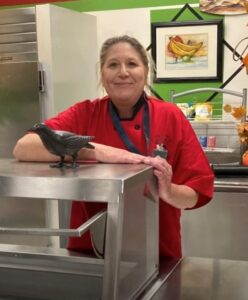
Her church recently purchased land for a new building, and she has participated in the construction process on work days. “I’ve learned some stuff from Habitat, so I’ve been more helpful than I would have been!” she said. She also serves her church community by providing meals and rides.
“Our center is in the middle of a neighborhood, and it’s so challenging to be a house of worship and to be in a neighborhood, because you are trying to tell the neighbors, ‘We’re good people,’ and then you have people come and they park right in front of the driveway of the neighbor!” Elwazeir said. “We constantly try to remind people this is a house of God. We’re trying to tell the whole world that we’re good people, but when you go block their driveway, it gives a conflicting message, so think about the neighbors!”
He added, “We’re constantly making announcements: ‘Be who your faith wants you to be. You’re coming to worship God, but the last thing God wants you to do is to disturb the neighbors!’ We’re trying to tell them that the faith teaches us to be good neighbors but you’re not applying it into your life.”
He provided a specific example: “I personally take an extra step to go and knock on the doors on the neighbors to introduce myself and say, ‘I’m the president of the Islamic Society; I’m a member; if you guys need anything, if you feel that we’re being disturbing, please reach out to me.’ And I promise you, I have neighbors texting in the middle of the night, at 2, 3 a.m. to say, ‘Hey, there’s someone in the backyard of your mosque.’ That’s how concerned they’ve become about the community.”
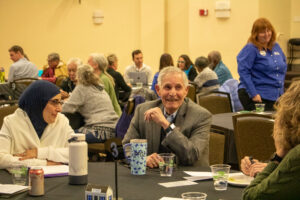 Conn shared that the Temple Beit Torah congregation wrote a letter of support to Mother Emmanuel AME Church in Charleston, S.C., after the 2015 shooting by a white supremacist that left nine people dead. He read the sentence, “The example your community represents in offering forgiveness is having a powerful impact around the world.”
Conn shared that the Temple Beit Torah congregation wrote a letter of support to Mother Emmanuel AME Church in Charleston, S.C., after the 2015 shooting by a white supremacist that left nine people dead. He read the sentence, “The example your community represents in offering forgiveness is having a powerful impact around the world.”
He also discussed a local example of neighborliness. “Temple Beit Torah experienced hurtful behavior several years ago,” he shared. “Our building was tagged with hateful graffiti on Hitler’s birthday. But we did not suffer alone. Neighbors who we had never met before turned up for the cleanup. They attended our services. They marched for us. They developed security patrols and really made us feel as part of the Bon Shopping Center neighborhood. We got to know our neighbors, and they got to know us. So what was basically an awful experience turned into a really precious one and continues to this day.”
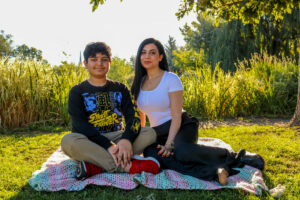
And Gilas shared a perspective that echoes other future Pikes Peak Habitat homeowners: “Since I’m working on my house, like volunteering, when I see my neighbors and they come to me and they welcome me, it just like makes you feel more like you’re it’s your home,” she said.

